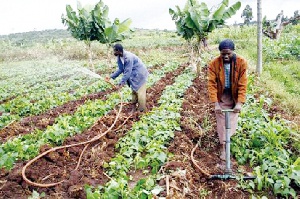 Some farmers spraying a their products
Some farmers spraying a their products
The agric sector remains one of the pillars of Ghana’s economy. More than 60% of the workforce is engage in agriculture. Government since 2007 had begun providing support in the form of subsidised tractor and fertilizer services to farmers. However, farming in Ghana still faces a mirage of challenges.
One of the challenges that need greater and immediate attention from stakeholders is irrigation. Farmers in northern Ghana are hard hit because the rains have delayed. The farmers are in a state of despair and are only hoping that God will give them rain.
Smallholder farmers in Burkina Faso uses drip irrigation which is finance by the Germany bank.
Burkina Faso unlike Ghana has large portion of her land being desert. Yet, Burkinabes are able to feed themselves and export vegetables.
Why is Ghana importing food when there are enough arable lands that support the cultivation of many crops?
Thankfully, the government led by H.E Nana Addo Danquah Akufo Ado has promised to construct dams in the north. The truth is that northern region has a vast arable lands, but crop farming will remain at the subsistence level if farmers continue to rely on the weather for water.
Government ‘Planting for Food and Jobs’ programme has received lots of commendation from farmers. The provision of improved seeds, supply of fertilizer and dedicated extension services will surely change the face of the agric sector.
Unfortunately, all these initiatives may not succeed if there is not enough water for farmers. This explains why stakeholders must put irrigation at the heart of all policy initiatives. The ‘one village-one dam’ project should be examined properly before its implementation. Not every village will have suitable condition to support the construction of dams. But government has the option to go for underground water through mechanised boreholes.
There’s every indication that government intends to do something positive in the agric sector. If the agric sector receives the necessary support, then Ghanaians will see a meaningful change in their lives. Government must put irrigation within the overall policy framework for the mechanisation of agric in Ghana.
The challenge in Ghana is that, our policies mostly look at doing things ‘the big way.’ This must change. Government should provide the enabling environment for the private sector to invest in agriculture.
Farmers could be supported with mechanisms that assist them to collect water during the rainy season. This reserved water can support in the dry season farming.